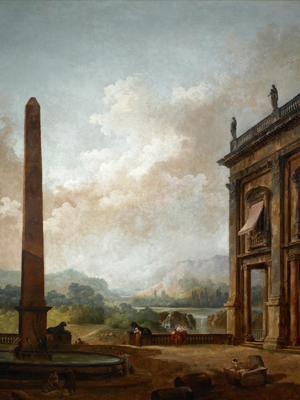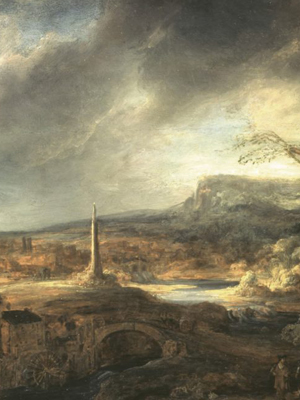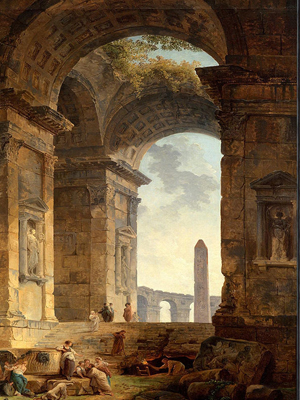Masonic Articles and Essays
The Ancient Landmarks
Carl H. Claudy
Date Published:
4/7/2023
Taken from the "Old Tiler Talks" series penned by Bro. Carl H. Claudy, this article expounds upon the concept of the 'Ancient Landmarks' and their importance to those Masons who wish to make a daily advancement in their Masonic Education.
"I bought me a Masonic Manual today," announced the Very New Master Mason to the Old Past Master. "Into what strange paths I am about to venture I don't know, but I am going to try..." rather shyly..."to learn some of the work.
"That is very commendable" agreed the Old Past Master. "You will find it a fascinating study."
 "But there are a lot of things in it I don't understand," went on the Very New Master Mason. "For instance, in the charge to a Master Mason the Master says, 'the ancient landmarks of the order, committed to your care, you are carefully to preserve and never suffer them to be infringed' and so on. But nowhere can I find any explanation of just what the ancient landmarks are!"
"But there are a lot of things in it I don't understand," went on the Very New Master Mason. "For instance, in the charge to a Master Mason the Master says, 'the ancient landmarks of the order, committed to your care, you are carefully to preserve and never suffer them to be infringed' and so on. But nowhere can I find any explanation of just what the ancient landmarks are!"
"Well, that is a problem, isn't it?" smiled the Old Past Master. "If you will get Mackey's Jurisprudence you will find a list of twenty five, Roscoe Pound has a list of seven in his book of the same name, Brother Joseph Fort Newton considers five is the number and several Grand Lodges have lists up to fifty or sixty!"
"Do you mean to say there are no universally known and understood list of ancient landmarks?" demanded the Very New Master Mason.
"I do. There is no such list."
"But... but... but then how can we 'carefully preserve them' and 'never suffer them to be infringed?'"
"Well, it really isn't as difficult as it sounds!" smiled the Old Past Master. "There is none, or hardly any, disagreement among Masonic authorities on the fundamental Masonic law. The ancient usages and customs of the fraternity are the same the world over and generally recognized as such by all Grand Bodies. But a 'landmark' is something that cannot be changed, according to our understanding of it. Therefore, different authorities have thought differently about our ancient usages and customs, some saying that such and thus, while ancient and honorable, is not a landmark, and therefore can be changed, while others hold that the same custom is a landmark and cannot be changed.
"The old manuscripts which give us so much light on our Masonic forbears; the Regius, the Harleian; the Antiquity, etc., have various charges, rules, regulations and laws. These are all very old, yet many of them could hardly be considered a landmark; for instance, one such old regulation forbids Masons to indulge in games of chance except at Christmas! That would hardly do for a Masonic landmark, would it? So just because a rule or custom is old does not make it, per se, a landmark.
"On the other hand, much that is beautiful in our fraternity is new; that is, it is less than three and often less than two hundred years old. There was no Grand Lodge before 1717, and Masonry was not divided in three degrees at that time, I believe. Yet many authorities consider the division of the work into three degrees as a landmark.
"So where doctors disagree, only the patient can decide!"
 "There are a certain body of laws, usages and customs which are universally recognized and regarded. From these, different authorities select certain ones which in their judgment are landmarks. Other authorities say 'no, thus and such is a law, statute, rule, judgment, agreement or custom of the fraternity but isn't a landmark!' Brother Shepard has just brought out a book on the subject which gives the ideas of many authorities, writers and Grand Lodges. What strikes me on reading it, is not the difference in the lists of what are called landmarks, but the fact that all so well agree as to what is fundamental in Masonry!
"There are a certain body of laws, usages and customs which are universally recognized and regarded. From these, different authorities select certain ones which in their judgment are landmarks. Other authorities say 'no, thus and such is a law, statute, rule, judgment, agreement or custom of the fraternity but isn't a landmark!' Brother Shepard has just brought out a book on the subject which gives the ideas of many authorities, writers and Grand Lodges. What strikes me on reading it, is not the difference in the lists of what are called landmarks, but the fact that all so well agree as to what is fundamental in Masonry!
"Now it is a fact that we agree that the 'ancient landmarks' are fixed and unalterable. It is also a fact that Masons themselves have altered their own unalterable landmarks! The very fact that Grand Lodges were invented, or discovered, or created, is a change in an old, old custom, made necessary by change in times and people. The issuing of diplomas was a change; for ancient brethren had only the 'Mason word' to prove themselves Master. We do not prepare a man to be made a Mason as was done two centuries ago, nor is our ritual the same, nor our obligation the same; antiquarians have even discovered where parts of our obligations came from, and it was not from a Masonic source that all of them were derived!
"But let not your heart be troubled! Masonry herself says of herself that she is a progressive science. How can she progress and stand still? Brother A. S. McBride than whom no more spiritually minded or common-sense writer ever spread Masonry before the Craft for their better understanding, asks the literal-minded Mason who says nothing can be changed in Masonry, why not work in Hebrew, since Solomon and his workman used that tongue? And does Masonry suffer because the English of today is not the English of the 17th century?
"I personally believe that the ancient landmarks which cannot suffer change are few in number; a belief in Deity, a belief in a future life, a book of Law on the altar, a secret mode of recognition, that only men, of good character, can be made Masons; these and one or two more seems to me to be real landmarks. Other landmarks so prescribed seem to me... and to many deeper Masonic students... to be common law, custom, usage, rather than landmarks.
"But I only think these things. I do not try to convince any one I am right, for those who decide have authority and scholarship behind them. I follow where they lead. Bit Masonry teaches a man to think, and so I do her no injury if I do think. And if my Grand Lodge says forty-seven laws are landmarks, I keep them like Kipling's Mason 'to a hair.' That I choose to disagree with my Grand Lodge in my heart doesn't make me a law-breaker; only a minority. And there is no harm in being a minority as long as one conforms!
 "Therefore, read your manual, learn your ritual, consult your Grand Lodge records, and abide by the laws, resolutions and edicts you have sworn to uphold. And when you have done that, tolerant charitable Masonry says to you 'my brother, having done as you pledged you would, you may now think whatever you want is right!'"
"Therefore, read your manual, learn your ritual, consult your Grand Lodge records, and abide by the laws, resolutions and edicts you have sworn to uphold. And when you have done that, tolerant charitable Masonry says to you 'my brother, having done as you pledged you would, you may now think whatever you want is right!'"
More Masonic Articles
Explore articles and essays written by Freemasons about Freemasonry.
Read More
Membership
Interested in becoming a member of the worlds oldest Fraternal organization?
Read More